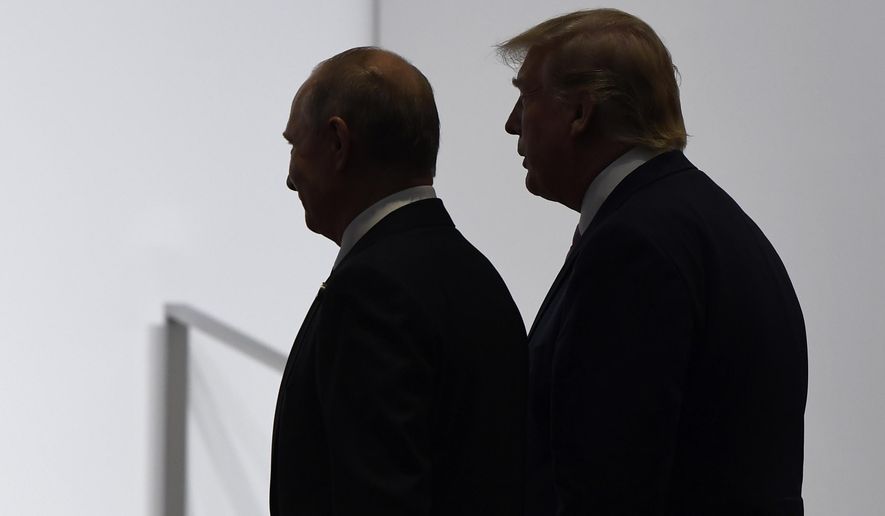Confusion reigned over the state of one of the world’s last remaining major arms control deals as the White House and the Kremlin jousted fiercely over U.S. contentions that an “agreement in principle” had been reached to extend and expand the 10-year-old New START treaty set to expire within months.
One day after top U.S. negotiator Marshall Billingslea talked openly of an tentative accord on a new arms control deal with Russia, the Kremlin is strongly denying any breakthrough on a rewrite of the New START deal and insisting it was not ready to give President Trump a foreign policy gift just because the U.S. election is less than three weeks away.
Top Kremlin officials insisted Wednesday that the U.S. and Russia have not yet reached an agreement to extend New START. Russian Deputy Foreign Minister Sergei Ryabkov called the proposed U.S. plan — which reportedly seeks to expand the scope of the restrictions on Russia’s military arsenal — “unacceptable.”
“If the Americans need to report to their superiors something about which they allegedly agreed with the Russian Federation before their elections, then they will not get it,” Mr. Ryabkov told the Russian media Wednesday.
A day earlier, Mr. Billingslea insisted that an “agreement in principle” had been reached to extend New START, an agreement sealed “at the highest levels of our two governments.”
“We are in fact willing to extend the New START treaty for some period of time provided that they, in return, agree to a limitation, a freeze, on their nuclear arsenal,” Mr. Billingslea said Tuesday at an event hosted by the Heritage Foundation think tank.
Mr. Billingslea said he was so excited by the prospect of a negotiating breakthrough that he cut short a recent trip to China to attend another New START negotiating session with the Russians in Finland. He suggested there was a “gentlemen’s agreement” on the terms of a new deal that perhaps had not “percolated” down to the Russian negotiating team.
The 10-year-old New START limits the number of deployable U.S. and Russian nuclear weapons at 1,550. The accord also reduced by half the number of strategic nuclear missile launchers each side may have and set up a new inspection and verification regime to prevent violations.
The two systems covered by the treaty are the new Sarmat intercontinental ballistic missile and the Avangard hypersonic missile stage, a maneuvering nuclear or conventional warhead delivery system.
Kremlin spokesperson Dmitry Peskov acknowledged the need to extend the treaty and told reporters Wednesday that he hopes both parties “are on the same track in this regard.”
“We understand that it needs to be extended, that this is in the interest of our two countries and the strategic security of the whole world,” he added, as quoted by Reuters.
President Vladimir Putin has said he is ready to extend the current deal another five years, something he and Mr. Trump could do on their own. Russia has balked at some U.S. demands in the talks and at the Trump administration’s argument that China’s growing nuclear arsenal should be included in the accord.
But with time running out, it’s not clear the two sides can even agree on where they disagree.
Mr. Ryabkov called Mr. Billingslea’s comments a “delusion” and “fraud,” Russia’s RIA Novosti news outlet said, and said Washington’s suggestion to freeze Moscow’s nuclear arsenal “unacceptable.”
Russian Foreign Minister Sergey Lavrov also expressed resistance to the U.S. proposal on who to extend the agreement and said earlier Wednesday that while he does not see a future for the agreement with the U.S., talks will continue.
President Trump has pulled out of three arms control treaties during his time in office. He has yet to sign such a pact.
Democratic presidential nominee Joseph R. Biden has expressed support for an extension of the current pact, negotiated when he was vice president in the Obama administration, and said on his campaign website that if elected, he will pursue an extension.
Chinese government officials have repeatedly said Beijing has no interest in joining three-way talks on an expanded New START deal, arguing their arsenal is far smaller than those of the U.S. and Russia.
• Lauren Toms can be reached at lmeier@washingtontimes.com.




Please read our comment policy before commenting.